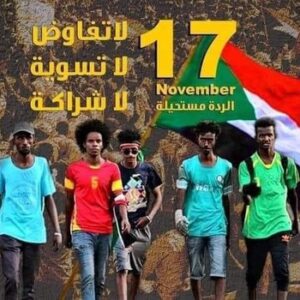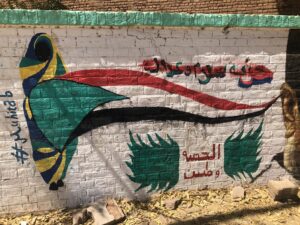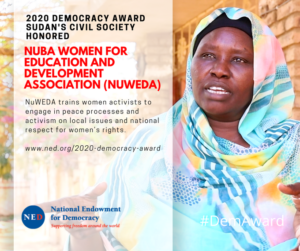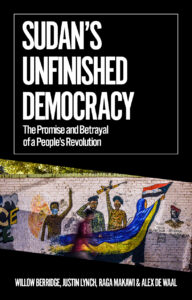
Screengrab
As fighting in Sudan enters its third week, rival generals have turned the country’s capital, Khartoum, into a warzone. Mohamed Hamdan, better known as Hemedti, and his paramilitary Rapid Support Forces are fighting with Abdel Fatah al-Burhan, who leads the Sudanese Armed Forces, Just Security reports. To help understand the conflict, what it means for the people of Sudan, and how it will impact the region, JS asks analysts Quscondy Abdulshafi, Suliman Baldo, and Rebecca Hamilton.
Sudan had become an important test case in President Biden’s core foreign policy goal of bolstering democracies worldwide, which in his view weakens corrupt leaders and allows nations to more capably stand as bulwarks against the influences of China, Russia and other autocratic powers, The New York Times reports:
“They put too much faith in what these generals have been telling them. These guys have been telling us what we want to hear since they agreed to civilian rule” after Mr. al-Bashir’s ouster, said Cameron Hudson, who served as the chief of staff to successive U.S. presidential special envoys for Sudan. “There was supreme confidence in the State Department that we were on the cusp of a breakthrough agreement.” Washington’s willingness to bargain with the generals after the coup had the effect of legitimizing them, Mr. Hudson said.
‘Pretend transition’
After Bashir was deposed, U.S. congressional leaders in both parties began calling for more diplomatic attention and resources to support Sudan’s transition to democracy. But the Trump and Biden administrations did little to either advance that reform or convince the two generals that there would be consequences if they broke their promises, The Post’s Josh Rogin adds:
 Many experts say that democratic transition in Sudan was a long shot and imposing sanctions on the generals would not have been effective. But they, too, say the administration has mishandled the policy. If the Biden team didn’t want to bet on actual reform, they argue, it should have at least played a larger role in shaping events.
Many experts say that democratic transition in Sudan was a long shot and imposing sanctions on the generals would not have been effective. But they, too, say the administration has mishandled the policy. If the Biden team didn’t want to bet on actual reform, they argue, it should have at least played a larger role in shaping events.
“We kind of pretended there was a transition when there wasn’t one,” said J. Peter Pham, a distinguished fellow at the Atlantic Council and a former U.S. special envoy for the Sahel region. “We should have been engaging both parties with a plan to move things along rather than wagging fingers at them.”
Both the Sudanese Armed Forces (SAF) and the Rapid Support Forces (RSF) see the struggle as existential and have little interest in ending the fighting, adds Suliman Baldo, Executive Director of the Sudan Transparency and Policy Tracker (@infosudantrans1). They are battling over power, control, and the kleptocratic networks that allow them to extract the country’s resources to both enrich themselves and buy off supporters to ensure the continuity of the system.
This political economy of grand corruption fuels the current zero-sum thinking and violence, he writes for Just Security.
The U.S. should appoint a Special Envoy for Sudan to elevate US policy toward Sudan and signal the administration’s prioritization of the current crisis. This post should be well-resourced and ensure that policy decisions are centered on the Sudanese people and their determined pursuit of a civilian-led government, said an open letter from NGOs, including partners of the National Endowment for Democracy (NED). It should also:
 Increase emergency assistance and support local civil society. Such assistance, via State Department and USAID programming, should provide urgently needed items to individuals and groups who are most at risk. It should also aim to prioritize Sudanese civil society groups, human rights defenders, journalists, and other democratic activists.
Increase emergency assistance and support local civil society. Such assistance, via State Department and USAID programming, should provide urgently needed items to individuals and groups who are most at risk. It should also aim to prioritize Sudanese civil society groups, human rights defenders, journalists, and other democratic activists.
No longer a case of hopeful democratic transition, Sudan is severely at risk for state failure and disintegration, Carnegie’s Amr Hamzawy writes. Saving Sudan from the horrible fate of state disintegration and restoring the prospects of stability, and later for democracy and development, are possible if regional and international actors work to integrate the militias in the national army and facilitate political talks between military and civilian groups.
Russia’s approach to the intra-military conflict in Sudan is more nuanced than it appears, says analyst Samuel Ramani. Russia’s primary goal is not to see one or another side win the civil war but rather to thwart a democratic transition in Sudan, as continued authoritarian rule facilitates profits from Sudanese gold mines and the construction of a Russian Red Sea naval base in Port Sudan, he writes for the Middle East Institute.
 The White House’s Africa strategy paper, released in August, asserts that “by reaffirming that democracy delivers tangible benefits,” the United States can help limit the influence of “negative” outside nations and nonstate groups, reduce the need for costly interventions and help Africans determine their own future, The Times adds:
The White House’s Africa strategy paper, released in August, asserts that “by reaffirming that democracy delivers tangible benefits,” the United States can help limit the influence of “negative” outside nations and nonstate groups, reduce the need for costly interventions and help Africans determine their own future, The Times adds:
Pressure to punish the generals came from senior members of Congress. Senator Chris Coons, a Democrat of Delaware on the Senate Foreign Relations Committee’s subcommittee on African affairs, co-wrote in a Foreign Policy article in February 2022 that the Biden administration should impose a “comprehensive set of sanctions on the coup leaders and their networks” to weaken their grip. RTWT
The Steering Committee of the World Movement for Democracy expressed solidarity with the people of Sudan and called on the international community to:
- Urge General Abdel Fattah al-Burhan and General Mohamed Hamdan Dagalo to cease fire and engage in a peaceful transition to democratic and civilian rule;
- Provide immediate humanitarian assistance to the Sudanese people caught in the crossfire and to those seeking safety at borders;
- Call the UN Office of the High Commissioner for Human Rights and African Commission on Human and Peoples’ Rights to invoke the “Responsibility to Protect” commitment of member states to safeguard the Sudanese populations from the violent conflict;
- Amplify voices of Sudanese pro-democracy civil society advocating for a peaceful democratic transition in Sudan; and,
- Ensure to place the Sudanese people’s aspiration for democracy at the center of resolving the ongoing conflict and putting a democratic transition process back on track.
As Sudan’s struggle for democracy continues, the Steering Committee of the World Movement stands in solidarity with the people of #Sudan. #KeepEyesOnSudan #StopWar
Read our statement here: https://t.co/BFfrPGe6UM pic.twitter.com/lkcPOtuTQR
— World Movement (@MoveDemocracy) May 3, 2023







